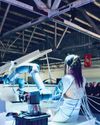
IN AN OLD SHOE FACTORY on the outskirts of Paris, new life is taking shape. A bank of PCR machines is multiplying plant DNA molecules by the hundreds of billions every few hours. Inside a gleaming white chamber, tiny emerald shoots are coaxed from single cells, unfurling in millimeters over a period of months.
It's a biologist's dream, says Patrick Torbey, CTO of Neoplants, a startup that's placing a multimillion-dollar bet on the air we breathe. Torbey grabs one of the clear plastic growing containers from the chamber and squints at his verdant creation: Nestled in a jelly-like growing medium called agar, it looks like a canapé-or, possibly, the future.
This is the Neo P1-a houseplant the firm genetically modified to help combat indoor air pollution. Pl is a tweaked form of golden pothos, commonly known as devil's ivy, one of the most ubiquitous and easy-going houseplants. Neoplants has engineered its DNA to boost its ability to sequester volatile organic compounds (VOCs)-formaldehyde, benzene, toluene, ethylbenzene, xylene-that are prevalent in the air inside homes and businesses.
The modifications also enable the plant to convert the VOCs into substances like sugar and CO₂ that it can use to grow. Once it has outgrown the agar, Pl will be planted in a pot designed to maximize airflow and sold with packs of bacteria that are added to the soil each month to help the plant metabolize VOCs. Due to hit stores later this year, Pl will retail for $179-roughly 10 times the cost of an ordinary golden pothos plant, and in the ballpark of a decent HEPA purifier.
This story is from the April 2023 edition of WIRED.
Start your 7-day Magzter GOLD free trial to access thousands of curated premium stories, and 9,000+ magazines and newspapers.
Already a subscriber ? Sign In
This story is from the April 2023 edition of WIRED.
Start your 7-day Magzter GOLD free trial to access thousands of curated premium stories, and 9,000+ magazines and newspapers.
Already a subscriber? Sign In

MOVE SLOWLY AND BUILD THINGS
EVERYTHING DEPENDS ON MICROCHIPS-WHICH MEANS TOO MUCH DEPENDS ON TAIWAN. TO REBUILD CHIP MANUFACTURING AT HOME, THE U.S. IS BETTING BIG ON AN AGING TECH GIANT. BUT AS MONEY AND COLOSSAL INFRASTRUCTURE FLOW INTO OHIO, DOES TOO MUCH DEPEND ON INTEL?

FOLLOW THAT CAR
CHASING A ROBOTAXI FOR HOURS AND HOURS IS WEIRD AND REVELATORY, AND BORING, AND JEALOUSY-INDUCING. BUT THE DRIVERLESS WORLD IS COMING FOR ALL OF US. SO GET IN AND BUCKLE UP.

REVENGE OF THE SOFTIES
FOR YEARS, PEOPLE COUNTED MICROSOFT OUT. THEN SATYA NADELLA TOOK CONTROL. AS THE COMPANY TURNS 50, IT'S MORE RELEVANT-AND SCARIER-THAN EVER.

THE NEW COLD WARRIOR
CHINA IS RACING TO UNSEAT THE UNITED STATES AS THE WORLD'S TECHNOLOGICAL SUPERPOWER

CALIFORNIA DREAMIN'
KINDRED MOTORWORKS VW BUS - Despite being German, the VW T1 Microbus is as Californian as the Grateful Dead.

THE INSIDE SCOOP ON DESSERT TECH
A lab in Denmark works to make the perfect ice cream. Bring on the fava beans?

CONFESSIONS OF A HINGE POWER DATER
BY HIS OWN estimation, JB averages about three dates a week. \"It's gonna sound wild,\" he confesses, \"but I've probably been on close to 200 dates in the last year and a half.\"

THE WATCHFUL INTELLIGENCE OF TIM COOK
APPLE INTELLIGENCE IS NOT A PLAY ON \"AI,\" THE CEO INSISTS. BUT IT IS HIS PLAY FOR RELEVANCE IN ALL AREAS, FROM EMAIL AUTO-COMPLETES TO APPS THAT SAVE LIVES.

COPYCATS (AND DOGS)
Nine years ago, a pair of freshly weaned British longhair kittens boarded a private plane in Virginia and flew to their new home in Europe.

STAR POWER
The spirit of Silicon Valley lives onat this nuclear fusion facility's insane, top-secret opening ceremony.